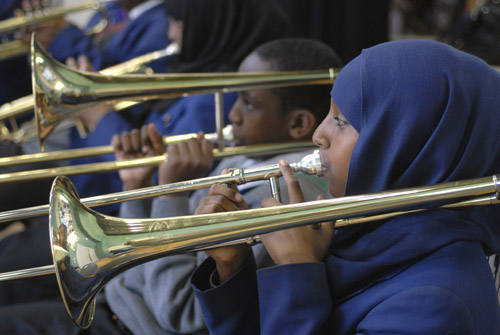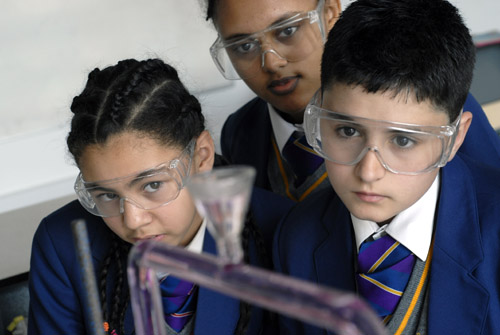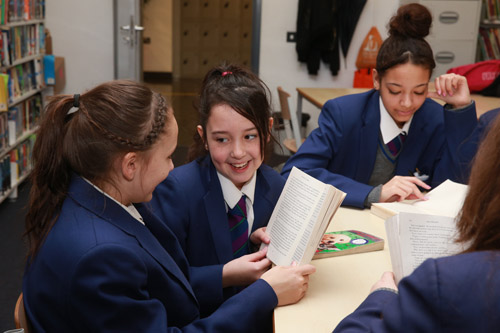We have high expectations for all our pupils and ensure that every learner is challenged and supported to reach their full potential.
Science Curriculum
The Science department aims to equip pupils with the skills to become lifelong learners and also provide the bedrock for understanding the world. Students are encouraged to develop a sense of curiosity about science and understand how science can be utilised to explain different phenomena.
The curriculum will enable pupils to:
- Develop scientific knowledge through the specific disciplines of biology, chemistry and physics.
- Understand key concepts of problem solving using scientific methods of investigation in a disciplined way.
- Encourage scientific thinking and a thirst for scientific knowledge.
- Reflect on the contribution that science makes to society and individual personal development as well as its implications for today and the future.
- Appreciate the responsibilities that science has in relation to the modern world, including social, moral, spiritual, cultural and ethical issues.
Key Stage 3 Science
The programme of study is in line with the national curriculum. The topics are:
- Cells and organisation
- The skeletal and muscular system
- Particulate nature of matter
- Atoms, elements and compounds
- Motion and forces
- Space Physics
- Energy transfer
- Chemical reactions 1
- Energetics
- Waves
- Reproduction
The programme of study is in line with the national curriculum. The topics are:
- Nutrition and digestion
- Health
- The periodic table
- Pure and impure substances
- Materials
- Electricity and Magnetism
- Relationship in Ecosystem
- Chemical reactions 2
- Energy calculations of fuel uses and cost in domestic context
- Adaptation and inheritance
The programme of study is in line with the national curriculum. The topics are:
- The Earth
- Motion, moments and pressure
- Material cycles and energy
- Photosynthesis and cellular respiration
- Cell biology
- Atomic structure
- The periodic table
- Energy
- Organisation
Key Stage 4 Science
In Science, pupils actively participate in their learning to secure outstanding progress in all aspects of the curriculum. This is due to well chosen, innovative and imaginative strategies used in their learning. Pupils build upon and deepen their scientific knowledge and understanding of concepts developed earlier in Key Stage 3. The department provides opportunities for our pupils to continue discovering how the world works as well as contributing positively to change.
The programme of study adheres to the national curriculum and the examining body is AQA.
The department offers Combined Science Trilogy (Double Science).
Pupils are awarded two GCSEs when they successfully complete the Combined Science Trilogy examination.
Year 10 topics (Combined Science Trilogy):
- Cell division
- Organising animals and plants
- Communicable diseases
- Preventing and treating disease
- Non-communicable diseases
- Photosynthesis
- Respiration
- The human nervous system
- Hormonal coordination
- Reproduction
- Variation and evolution
- Genetics and evolution
- Structure and bonding
- Chemical calculations
- Chemical changes
- Electrolysis
- Energy changes
- Energy transfer by heating
- Energy resources
- Electric circuits
- Electricity in the home
- Molecules and matter
- Radioactivity
Year 11 topics (Combined Science Trilogy):
- Adaptations, interdependence, and competition
- Organising and ecosystem
- Biodiversity and ecosystems
- Rates and equilibrium
- Crude oil and fuels
- Organic reaction
- Chemical analysis
- The Earth’s atmosphere
- The Earth’s resources
- Forces in balance
- Motion
- Force and motion
- Force and pressure
- Wave properties
- Electromagnetic waves
- Electromagnetism




